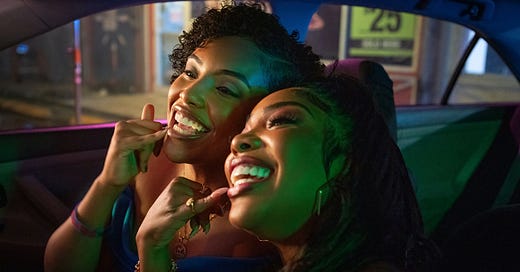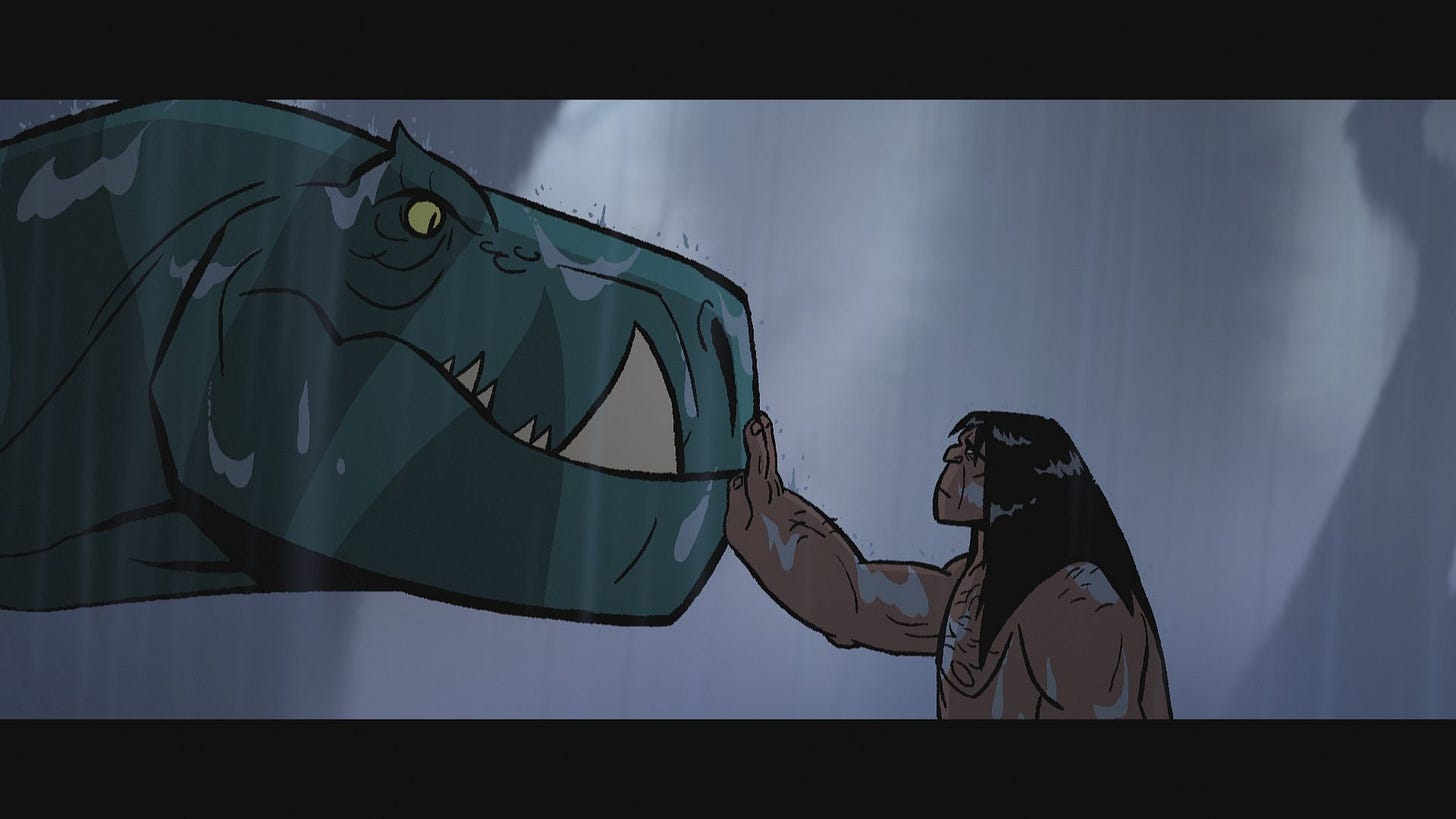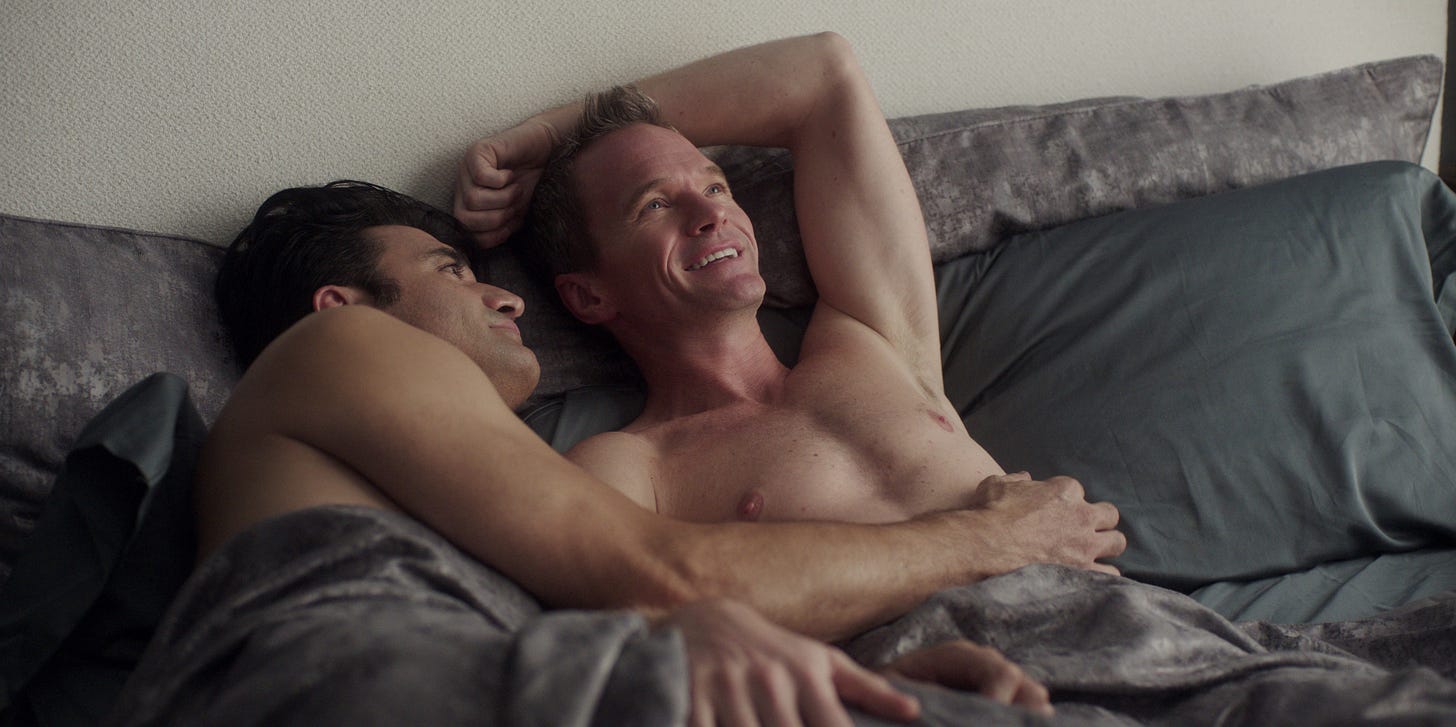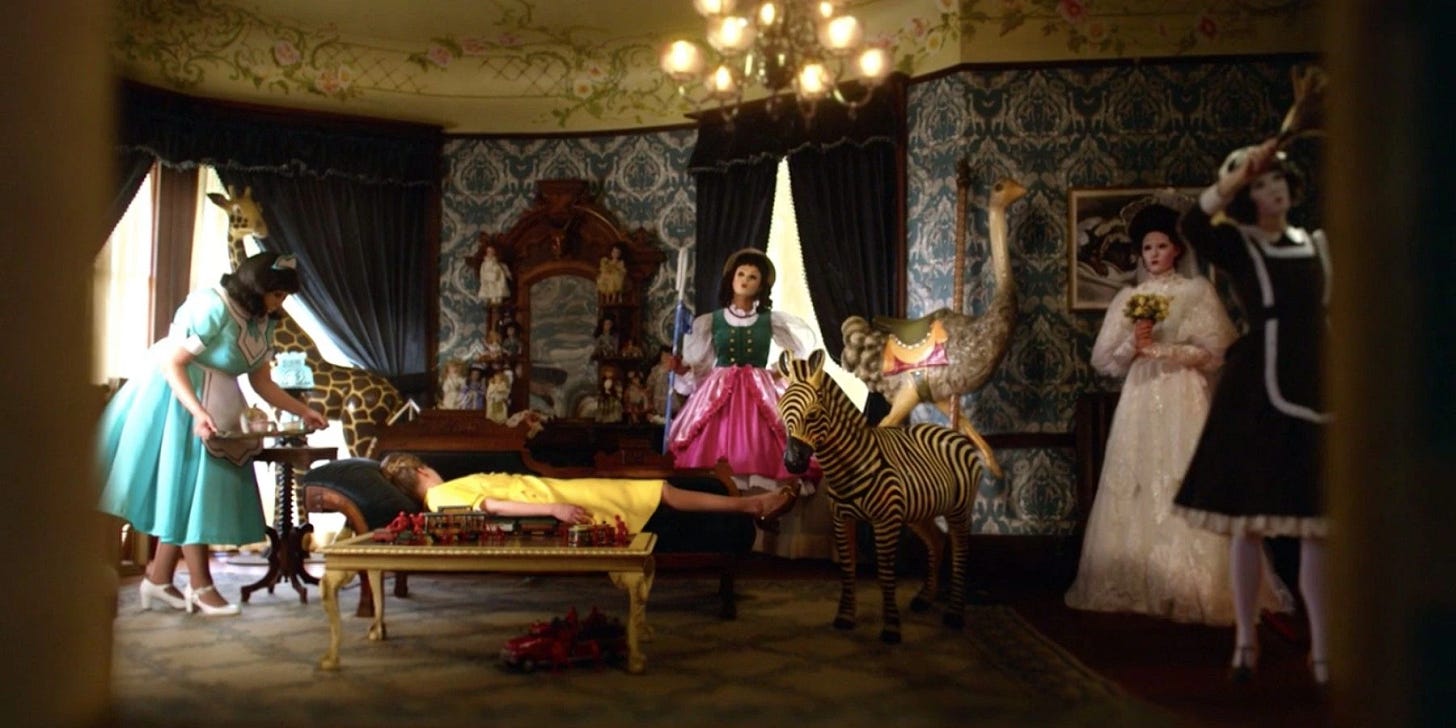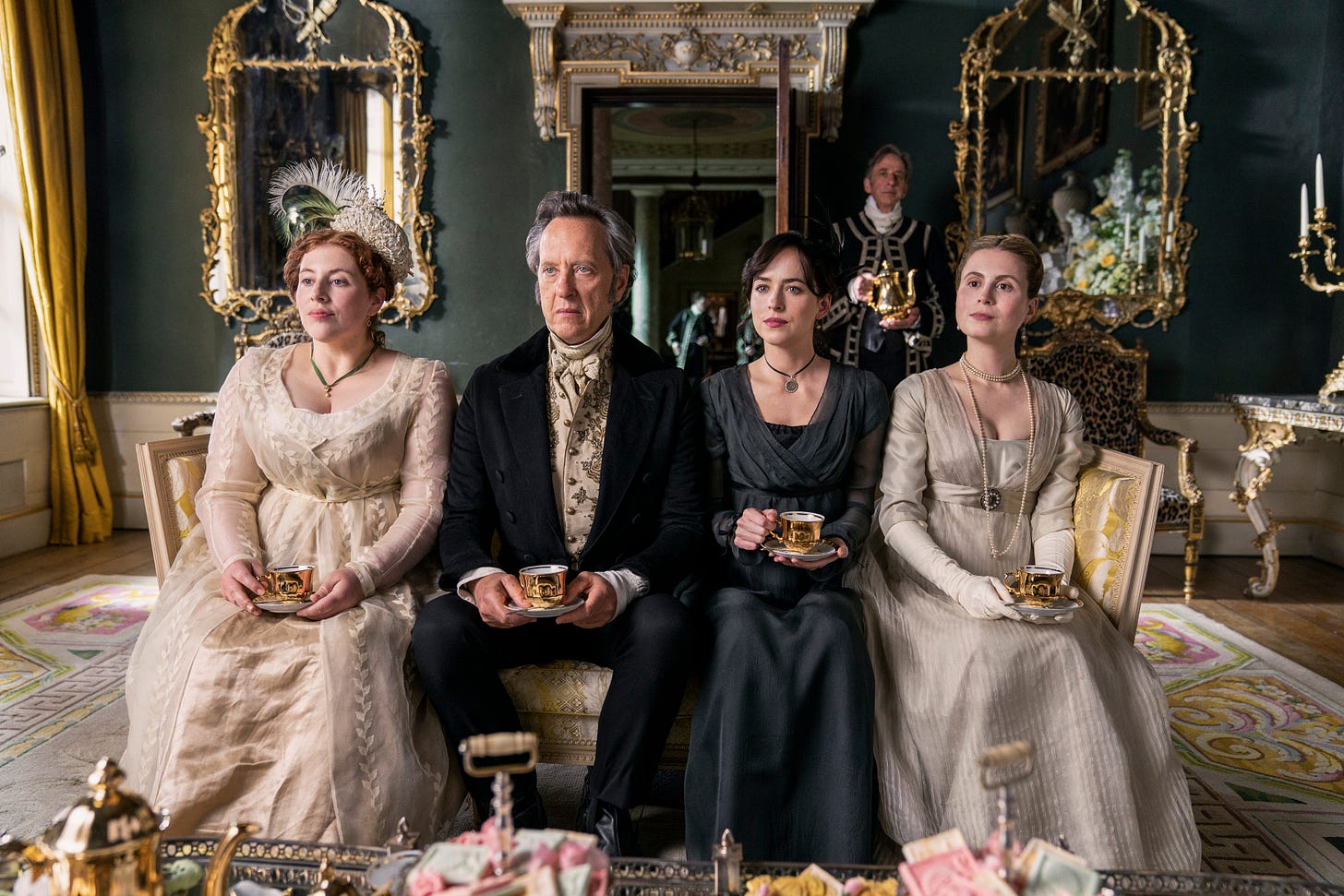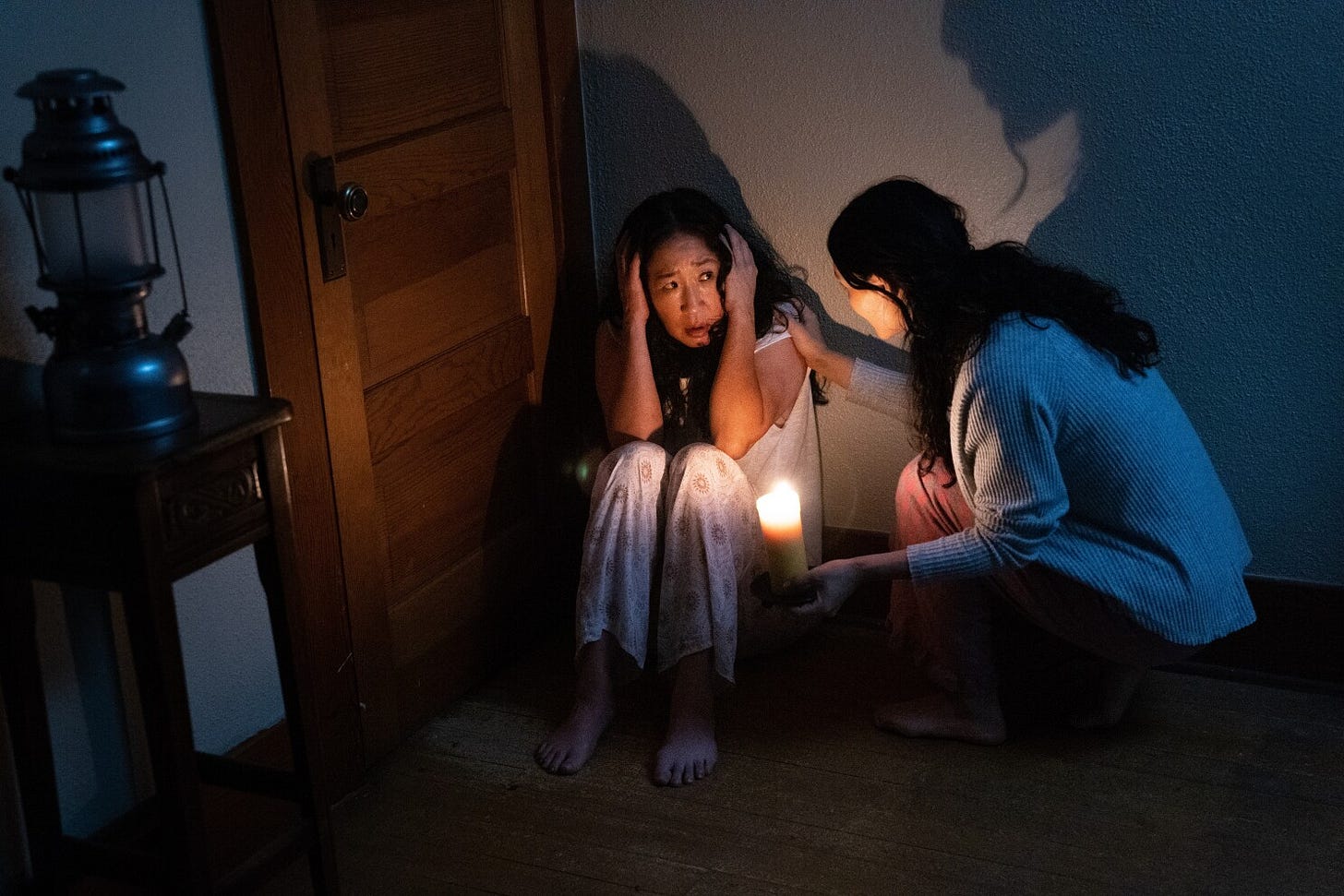There’s something about the end of July, readers, something that at the beginning of August starts to make one think that the year is already effectively over. Perceived time slips, as we start to see the beginning of August as a signal of the approaching end of August, the approaching end of August as a signal of the approaching end of summer, and consequently the approaching end of summer as a signal of the cascade of fall holidays that will carry us directly through New Year’s and into 2023.
However, this illusion of our already knocking on January’s door is only what happens when we forecast our futures the same way we tend to remember our pasts: as highlight reels of peak moments, stripped of all the everyday material otherwise serving as yards and yards of crucial connective tissue.
The illusion also rushes us past September’s annual Emmy Awards and past a lot of what I’m sure will be the very best cinematic content 2022 will ultimately have to offer.
So, don’t despair, readers, at the new month on the calendar. There are months and months of time left to claim this year, and I’m planning on sitting here with you through all of them, to pour ever more servings of this Hot Tea.
This week, our teas on tap include the new venture from one of Black American television’s foremost voices, the semi-long-awaited returns of two series for their second seasons, and the débuts of several adaptations of familiar storylines in new settings.
Enjoy! ☕️🫖
Rap Sh!t (Series Premiere)
HBOMax • Sensitive Satire • Money, Cash, Sacrificing Principles for Income?
Synopsis
A floundering social activist and rap artist finds unexpected chemistry with a glamour-chasing single mother who works several jobs to make ends meet.
My take
Issa Rae pens an inventive and almost flawless pilot in HBOMax’s new half-hour comedy Rap Sh!t. However, stumbles in the subsequent episodes’ teleplays (credited to other writers) make me doubt the thorough-going quality of this new black-female- and social-media-centric series.
Told almost exclusively through the front- or back-facing camera of one of the central characters’ mobile phones, Rap Sh!t introduces itself as a socially intelligent, yet infinitely relatable inspection of our common cultural rally points (viz., money, fame, success, and sex) — pivotally through the panoptical and literal lenses we all have become so accustomed to viewing ourselves and our worlds through. This chosen perspective advances the concept of faux documentary and ‘found footage’ past the occasionally present interjections of text message scroll overlays or mobile phone footage we can find in other shows (e.g., Euphoria [Levinson (creator), 2019-Present]) and into an ever-present medium, dynamically self-referential and automatically incorporating us viewers as complicit followers of the spectacles on our screens. Foucault and Hitchcock would be screaming, y’all!, were they both still alive and both not attending to one crucially divergent detail from their own grim visions: voluntary agency in the invitation to spectate. Whereas Foucault imagined a prison complex subduing its inmates through forced spectation by and through the lens of a third party’s all-seeing eye (not unlike the eye of Sauron; Tolkien, 1954-1955) and Hitchcock sealed Grace Kelly within the glass prison of the camera, her three-dimensionally outstretched hand a desperate plea to her audience for help but ultimately a futile and forever impossible attempt to connect (Dial M for Murder, 1954), Rae’s screenplay as manifested by Sadé Clacken Joseph’s directing and Lucas Gath’s camerawork is crucially a voluntarily initiated and realized portal into the Rap Sh!t characters’ lives through which the audience can easily step, progressing from viewers to participants. Thereby posing on a clever interplay between the objective and the subjective viewpoints — a perspectival duality Spanish painter Diego Velázquez might well recognIze from his own work (1656) — Rap Sh!t invites the people’s gaze as peers’, as participants’, and as judges’ as freely and actively as its characters struggle to define and set boundaries with others actually sharing their lived realities. This almost flawless attention to and union of theme and medium in both story and storytelling techniques does truly make the Rap Sh!t pilot one of the very finest I’ve ever seen on television.
And were it only the pilot I were giving my take on, the temperature check here surely would read “Steaming.” However, the inability of another show writer to fully complete the graceful pass Rae throws from episode 1 is an unfortunate signal that the rest of the season and possibly the series will regress toward a less complete and more everyday quality, still entertaining and maybe even interesting, but inevitably pale in comparison with the opening. For, it’s not that the show abandons everything Rae, Joseph, and Gath set up in episode 1 tout de suite in episodes 2 and 3; the story and the storytelling in those later episodes still very much look at a glance quite identical to the story and the storytelling in episode 1. No, it’s the deeper layers that change here; the writing is looser and less polished, the content consequentially feels less driven and more exploratory, and the camerawork I’m sure relatedly feels more The Blair Witch Project (Myrick & Sánchez, 1999) than Las Meninas. I still care about the characters and their challenges; the message is still critical of, yet comfortable with the popular goals of our time and society; and the general vibe to any casual viewer not interested in the deeper text is still recognizable and fun (as any comedy should be). I’ll just continue to hope for more again. Once we know a creator can hit an episode out of the park, we as viewers always want to see another clear the fence.
Temperature check
Tepid (but with a scalding first note)
Primal (Season 2 Premiere)
HBOMax • Animation • The Wild at Heart
Synopsis
Following the loss of an unexpected attachment, two unlikely companions must separately determine how they feel about making connections outside each other.
My take
The return of Genndy Tartakovsky’s brilliant and Emmy-Award-winning original series Primal these past two weeks was cause for significant celebration — at least in my house, readers. The former Dexter’s Laboratory (1995-2003) creator and showrunner’s nearly wordless exercise in exquisite visual storytelling was a highlight of my early pandemic, when I found the series thanks to its recommendation by a friend. Hopefully, here I can perform the same function for you as he did for me: surfacing what might otherwise be an under-the-radar gem.
Unlike Dexter’s Laboratory in nearly all aspects of tone and character, Primal is an incisive in(tro?)spection of emotionally laden relationships: their origins, their meanings, their potential fleetness, and the difficulty of their survival in a chaotic world. Yes, it is about a a Neanderthal and a Tyrannosaurus, but let not that set dressing fool you, reader: The heart of this show is heart, not aggression. Tartakovky’s choice of setting and characters allows an immediate access channel for the deeply felt, raw, undressed passions that often rule the dynamics of interpersonal bonds — at least below the surface. Like some of our culture’s most intelligent art, these subjects require little more articulate expression than such raw substrates as those he chooses in Primal, to inspire and engage human audiences. In this way, I’d liken the impact of the series more to the impact of your favorite of Goya’s paintings than to the impact of another animated show about warriors (e.g., He-Man and the Masters of the Universe [Sweet (creator), 1983]).
So, if you’ve never spent time with Primal before, I’d encourage you to do so, starting with the very first season, also available on HBOMax, before stepping into the new season. Though any episode could speak well on its own, the sincere dedication to the throughline of the story across all its episodes also distinguishes the series for care and attention above its peers — a distinction no doubt reflected in Primal’s three Emmy wins (i.e., two consecutive for Outstanding Individual Achievement in Animation, a category trained on the art and design of now canonical characters like the stop-motion figures of Animated Epics: The Canterbury Tales [1998-2000], and one more for Outstanding Animated Program for its first season).
Temperature check
Hot
Uncoupled (Season 1)
Netflix • Comedy • In(ter)dependence
Synopsis
The sudden departure of his long-term boyfriend from their relationship and apartment leaves a forty-something Manhattan-based realtor grasping at straws.
My take
Darren Star is no stranger to creating televisual hits. From Beverly Hills, 90210 (1990-2000) through Sex and the City (1998-2004) to Emily in Paris (2020-Present), the producer and writer has hardly had more than one miss (according to popular esteem) in his entire career. Focusing primarily on stories about single adolescent or adult women of a certain culture (i.e., rich, white, and interested in fashion), he is responsible now for having influenced the lives of literally millions of women (and men) the world over, through what could quickly be called ‘aspiration porn.’ As his characters have increasingly led lives with an emphasis on appearance, so have they increasingly set bars in what are now four separate decades of fashion — and, crucially, what “fashion” implies here goes well beyond mere clothing and accessories, into personal values and social norms.
Within the past year, Star has given his audiences two new series, both focussing on how members of his favorite subculture deal with the ends of romantic relationships and both designed again with a special attention to appearance.
The earlier of these two series, this past fall’s largely unsuccessful follow-up to his most successful series Sex and the City, the execrable And Just Like That… (2021; see my take on it here), concentrated on wealthy, white, and fashionable women who see their heterosexual relationships ending because of the interference of physical age: Carrie’s husband passes away in cardiac arrest in his late 60s, after years of smoking cigars and living generally unhealthily, while Miranda’s husband drifts away into doddering antiquity, leading her to question her sex life and her vitality as those of a not-quite-yet over-the-hill adult woman. The two attend funerals, lunches, and nightclubs in haute couture’s latest inventions and debate the social politics of grieving, vows, and related etiquette.
The later of Star’s two new series, the brand new Uncoupled on Netflix, goes one step farther on two dimensions.
By concentrating on one wealthy, white, and fashionable man’s ending relationship alongside one uber-wealthy, white, and fashionable woman’s similarly ending relationship, the show breaks at least superficially from Star’s now age-old primacy on women.
Furthermore, by devising ending relationships due to the indirect rather than direct effects of physical age, the show probes the space after “happily ever after,” where vows of “in sickness and in health” don’t really apply but death still looms perceptually large on the ever-nearing horizon. Neil Patrick Harris’ Michael crumbles while watching his 50-year-old long-term boyfriend panic and flee from the predictable certainty of living out the rest of his days in a routine, even though the same image comforts Michael himself; and the same divergence in outlook troubles and divorces the marriage of Marcia Gay Harden’s Claire to an overweight wealthy white man who abruptly leaves her for a woman not more than a few years older than their eldest child.
Though material fashion here takes a more subdued role than what we’ve seen it take in Star’s prior series, the characters still convene in hot clubs or popular get-always, still fret and/or flaunt their outfits and overall looks, and still debate social politics — here, specifically those of “winning” a break-up, dating younger or older, consuming drugs and casual sex, and related etiquette. Though indeed the protagonist and his partner are both men, the show here is really just a dress cut to match the collection of Star’s past works. After all, Michael, as a perhaps too emotionally available domestic care-taker and supporter in his suddenly former romantic relationship, is barely any different on the page from any female protagonist Star has written before — a fact that Star himself underlines by highlighting the parallelism between Michael’s and Claire’s stories early in the season.
The potential for new interest in the exploration of the effects of the approaching vision of death on the late middle-aged person’s (here, the heteronormative man’s) psyche is, on the other hand, mostly wasted, washed away in the lukewarm comedy meant to entertain the audience of the show and otherwise kept out of focus because that dilemma, sadly, is here the antagonist’s territory, not the protagonists’s.
Consequently, in Uncoupled, Star leaves us with a barely entertaining fumble of episodes, faintly tying back to a dilemma between what is familiar and what could be an adventure, a set-up that only the impressive acting of its cast could elevate — and, frankly, this cast does little to that effect. O, don’t misunderstand me, readers; the cast is completely adequate, meeting the marks set out on paper well enough all around. It’s just that almost never in the show is any actor doing so much to enrich the story, that it improves the overall output directly because of his or her talents. Αnd I say this all to you with full awareness of (1) my affection for Ms. Harden and (2) the perennial congeniality of Mr. Harris, a man still best known for playing an adorable child prodigy turned physician on television despite having much more recently won a Tony Award for playing an intersex rock singer on the stage.
All in all, Uncoupled is lazy recycled content, wearing only the dress of socially important fare as if it really lived it.
Temperature check
Cold
American Horror Stories (Season 2 Premiere)
Hulu • Horror • Anthology
Synopsis
A series of disconnected episodes invites the viewer to experience the supernatural creepiness of everyday American living, past, present, and future.
My take
Ryan Murphy’s beloved “cult classic” series American Horror Story (2011-Present) last year did the wise thing of turning its many one-off ideas for horror stories, each of which was either too short or too out of scope to be woven into a long-form season, into their own anthology season, stringing together the independent tales each in whatever televisual time it needed in order to be well told. The output I very much liked — not just as a great use of what otherwise would have been clippings from the writers’ cutting room floor, but also and moreover as a chance to get more bite-sized horror variety in the way Nickelodeon’s memorable Are You Afraid of the Dark? (1992-1996) or Netflix’s more recent Black Mirror (2011-2019) have delivered thrills and chills. These capsules of sci-fi or supernatural phantoms go down easily as compelling smaller doses of what an entire season otherwise ultimately ships as a kilo, and frequently are more compelling in their constrained dimensions than more elaborated tapestries. Whetted appetites agreed; the show was green-lit for a second season.
A few episodes into this new second season, I’m pleased to say, I’m still liking that it’s more of the same.1 Already confronting themes like sexism, moral responsibility, and forgiveness from strikingly different angles in its premiere two episodes, the new season promises a continually interesting set of takes on interpersonal and social issues that we as a culture always need to discuss and better understand.
While I am hardly wowed by anything in the season so far, if you like I call yourself a fan of horror, I think that you’ll also like the way this season is turning out.
Temperature check
Tepid (unless your kettle pre-heats for horror)
Persuasion (2022)
Netflix • Romance • The Pressures of Conformity
Synopsis
After social expectations press her into breaking with the man she loves, a young woman touches the edge of spinsterhood as her relatives use her as a sounding board for their own problems.
My take
Carrie Cracknell and Dakota Johnson seem to think that immediately winking directly at the camera will engage a thrilling confidence with an otherwise unwon audience, or at least will be a charming enough substitute for the effort of actual endearing-character building, that they need not actually attempt that building anywhere else. Decidedly, they’re wrong.
I can’t even praise the costumes here, readers, because this time it’s all bland.
Watch only if you’re a naïve teen-aged girl.
Temperature check
Cold (bitterly so)
Umma
Netflix • Horror • Freaky Friday, in Korean
Synopsis
An emotionally scarred parent suffers startling visions of her own mother, after a family member brings the mother’s remains to mourn, to honor, and to bury.
My take
Sandra Oh is no slouch. A 2010 ‘Rich Pick’ nominee for her moving supporting performance in Rabbit Hole (Mitchell [dir.] & Lindsay-Abaire [wri.], 2010) and a 13-time Emmy Award nominee for her performances on series like Grey’s Anatomy (Rhimes [creator], 2005-Present), Killing Eve (2018-2022), and Saturday Night Live (Michaels [creator], 1975-Present), the actress is well acquainted with not only how to craft a character but also how to attend carefully to crafting it well.
It’s this evident history of experience in her career that surprised me, when watching her in her newest project, Umma, a domestic horror film steeped in psychodrama and familial turmoil à la classics like Rebecca (Hitchcock [dir.], MacDonald, & Hogan [wri.], 1940), 藪の中の黒猫 (A Black Cat in a Bamboo Grove, Shindo, 1968), and The Others (Amenábar, 2001) in all of which leading women are brought to their knees by haunting experiences. From the outset and its premise, I would have thought Umma perhaps an ideal vehicle for Oh to show her dramatic range. However, after watching it, I saw that vehicle drive straight into a wall. The choices are boring, the narrative simple, the payoff trite; and Oh does little to rescue it from this fate. She is, unusually, platitudinous and dry. I lament this end result!
Temperature check
Cold
Not Okay
Hulu • Drama • Social Shaming
Synopsis
The glitter of a chance to attract attention topples into a catastrophe of misjudgment and then punishment for a daffy twenty-something in Manhattan.
My take
I initially wasn’t going to write about Not Okay, Hulu’s latest offering to the Zoomer viewer gods. Actually, I wasn’t even going to watch it. Riddled with the telltale signs of wannabe adolescent strife and the maudlin melancholy that usually overlays it, the new film seemed much more like a waste of time than a welcome entertainment. However, something — perhaps the relative drought of better-looking content elsewhere, perhaps the stiff promotion of the film on Hulu’s main page, or perhaps even the morbid curiosity I felt was motivating me to watch Dylan o’Brien act a fool in his own wannabe way — inspired me to tap the “Play” button this morning — and, surprisingly, I’m kind of glad I did.
However, I’m notably only “kind of” glad, readers, only “kind of.” Not Okay benefits clearly from three winning qualities that elevate it above the rest of the trash heap that was its initial expectation:
writing that manages to avoid the cliffside of believing its own hype too strongly,
a great leading performance, and
editing that helps pace the action alongside the drama and make the movie feel alive and even at times fun.
Unlike the later seasons of the eventual Netflix bear 13 Reasons Why (Yorkey [developer], 2017-2020), to which the tone of Not Okay could otherwise be easily compared, the runtime of Not Okay importantly sidesteps too heavy a hand or heart on the undeniably serious emotional, social, and political obstacles it stands in the way of its characters. Where Justin Foley’s dying of complications related to AIDS reeked of a social and a medical tone-deafness that cast a pall over the entirety of 13 Reasons Why’s ridiculous last season, Danni Sanders’ emotional throttling below the surface while forced by her own trickery to live out an increasingly devastating lie for her own benefit felt all too plausible to consider any way other than earnestly and raptly. That Zoey Deutch was able to inject into even the lowest moments in Danni’s journey a dippy glow, radiating from the good internal place within her character who strives only for human connection and breaks many times over when she fails to find it, imbues the otherwise heavy journey of the cross-bearing anti-heroine with both a relatable optimism that one day, perhaps, things may turn around for that character and a credible obliviousness that sustains that optimism despite the severely misguided reality of the actions the character takes in order to turn those things around for herself. It’s actually a great, non-obvious performance. And the editing to snap our focus onto only the important, if crushing, milestones that dot Danni’s path — especially the montage early in the film to survey her ‘creative’ process — assembles everything in the ‘right’ order. Ultimately, I really enjoyed the dramatic tension these three elements together were able to wind up.
That is, I did enjoy that tension, until the social comeüppance without which, I admit, it would have likely been very difficult to produce this story in a mainstream film. It’s really too bad though. What I pined for most ardently as the tension kept accumulating in Not Okay was for the film to defy my sadly accurate foresight — spoiler alert — that Danni would ultimately not get away with her misdoings, despite their gravely taboo nature. It’s true: I didn’t want the straightforward public crucifixion of the trespasser, the EZ-bake confection of a morality tale a third-grader could identify as the only way to actually serve justice to as corrupt a miscreant as Danni Sanders undoubtedly is in Not Okay; no, I wanted Election (Payne, 1999) instead, I wanted The Social Network (Fincher [dir.], & Sorkin [wri.], 2010) instead, I wanted Black Mirror’s “White Christmas” (Tibbetts [dir.] & Brooker [wri.], 2014) instead! All of those order-of-magnitude more powerful stories surprised and upset audiences to their perverse delights, because the stories’ denouements allowed their central asocial self-victimizers to seemingly get away with their shady moves — at least for a moment. This appearance of guiltlessness riddles and frustrates and punches so much harder than straight-and-narrow fables, because there is an inherent and relatable travesty in the existence of an obvious wrong left unrighted AND because there is an ever haunting quality to the realization that a wrong-doer in such an unrighted case must consequently live on with the gratingly dissociative knowledge of his or her past ‘crimes’ mentally alone forever. The mercilessness of that style of ending makes each of those stories so incredible.
Had Not Okay walked down the alternative and merciless path instead, letting Danni’s fiction of a world never become publicly known, her relationships deepen at the cost of her knowledge of her lies, and her suspicious and righteous co-worker instead find a tragic ending, I might have been wowed into truly praising the film for its critical achievements. However, as it is, it’s merely fine: a critically adequate entertainment.
Temperature check
Tepid
Thanks for reading Rich Reviews! Subscribe for free to receive new posts and support my work.
Really, anthology is the only storytelling format wherein the quality “more of the same” can ever actually be a good thing.

